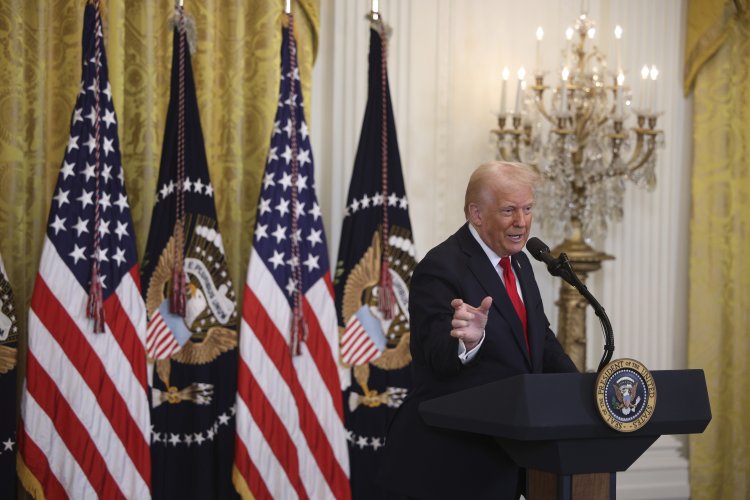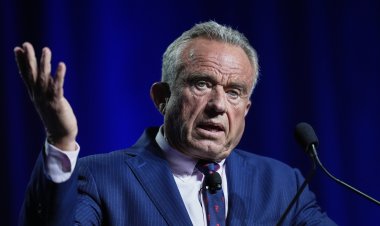As its justifications fail, Team Trump goes on the defensive over the Signal chat controversy
Although Trump seldom acknowledges errors, numerous allies stated on Wednesday that this is precisely what the White House should have done.

However, as the fallout from the administration’s inadvertent leak of military strike plans to a journalist extended into a third day, skepticism arose even among some allies.
On Wednesday, the White House continued to assert that there was no breach of national security when national security adviser Mike Waltz mistakenly included a journalist from The Atlantic magazine in a group chat where Defense Secretary Pete Hegseth shared details about an upcoming attack on Houthi fighters in Yemen. Yet, their defense began to fray under scrutiny.
Some longtime Trump loyalists expressed frustration at being misled by an administration they had celebrated for its common-sense, straightforward approach. Many insiders and outsiders urged that Waltz should accept responsibility for the error.
Although Trump is known for rarely admitting errors, several of his allies indicated on Wednesday that the White House should own up to the situation to maintain trust.
“The White House is in denial that this was not classified or sensitive data,” said Rep. Don Bacon, a Republican from Nebraska and former Air Force officer. “They should just own up to it and preserve credibility.”
Typically, presidents search for someone to blame in the aftermath of a crisis, but Trump’s supporters emphasized that such actions could be perceived as an admission of defeat. They aimed to present a more united front than during his first term, leaving little for senior Trump officials to do but offer clumsy, sometimes contradictory justifications.
These justifications included asserting that a successful missile strike on the Houthis negated worries over the leak, arguing the plans shared were not technically “war plans,” and criticizing the character and politics of Jeffrey Goldberg, the editor-in-chief of The Atlantic, who found himself unintentionally included in the chat.
Trump placed the focal point of blame for the incident—deemed a "witch hunt"—squarely on Waltz, who included Goldberg in the chat, rather than on Hegseth, who disclosed the sensitive information.
"It had nothing to do with anyone else. It was Mike, I guess. I don't know. I always thought it was Mike," Trump said. "Hegseth is doing a great job. He had nothing to do with this."
The White House’s handling of the unintentional leak has drawn comparison to the criticisms leveled at the Biden administration for allegedly misleading the public on the president’s health and other important issues. In an unusually candid moment for an administration focused on loyalty, some insiders are urging the White House to improve its response.
“A lot of people’s BS meters are going to go off, and rightfully so when you tell them that Casper the Friendly Ghost added [Goldberg]. Like, come on, don’t insult our intelligence,” remarked Tomi Lahren, a Trump supporter and conservative commentator at OutKick, a pro-Trump website. “Tell us it was a big mess up. Tell us you take full responsibility and accountability.”
Some of Trump’s most ardent supporters, including Dave Portnoy, president of Barstool Sports, have gone further in their calls for accountability. In a video shared on X, Portnoy urged the president to dismiss Waltz, acknowledging the importance of loyalty but deeming the incident a “fuck-up of epic proportions.”
The calls for accountability stand in contrast to many of Trump’s allies, who have historically resisted demands for responsibility in the wake of impeachments, indictments, and ongoing doubts about his claims of winning the 2020 election.
Internally, Waltz has faced significant criticism for supposedly adding Goldberg to the chat, reflecting the tightrope he walks within an “America First” administration that remains wary of his neoconservative ties. While Hegseth has come under scrutiny for sharing details of the attack, there have been no calls for his dismissal, in stark contrast to Waltz, whose future appeared uncertain as of Wednesday afternoon.
During the briefing, Leavitt did not dismiss the possibility that Waltz could be removed from his position.
Frustration grew among White House staff and Trump’s allies over Waltz’s challenging appearance on Fox News on Tuesday night, where he seemed to falter, retract statements, and double down on his claims about how Goldberg’s number ended up in his possession and in the group discussion.
“People are mad that Waltz didn’t just admit a mistake and move on,” noted a senior administration official, who, like others mentioned in this article, spoke on the condition of anonymity due to the sensitive nature of the discussion. Waltz’s handling of the situation has sparked concerns that he is exacerbating the White House's issues.
Those within the administration and close to the White House fear that Waltz’s decision to request tech mogul Elon Musk to investigate the leak could lead to further political backlash. “Waltz just opened the door for the FBI to investigate the compromise of his text chain,” one individual communicated in a message shared with PMG.
Another source voicing concerns about Walter’s comments described them as “bullshit,” warning that he risks someone else calling him out on it.
The confusion surrounding Waltz’s explanations is merely one component of what has turned into a disjointed messaging strategy involving White House communications staff, top officials testifying before Congress, and the president responding directly. Just after Waltz claimed on Fox News that he took “full responsibility” for the inclusion of Goldberg's number in the chat, Trump appeared on Newsmax to attribute blame to a Waltz staffer.
Outwardly, the White House has maintained a unified stance that the concern lay with The Atlantic’s report—rather than its contents. Leavitt referred to The Atlantic story as a “hoax,” while communications director Steven Cheung claimed the magazine “falsely alleged” war planning in the chat. Deputy chief of staff Taylor Budowich labeled The Atlantic’s reporting as “LIED.”
Meanwhile, Pentagon spokesperson Sean Parnell, who was traveling with Hegseth in the Indo-Pacific, dismissed the story as a “hoax” on Wednesday, asserting that Hegseth was merely updating the group on an existing plan.
Those close to the White House labeled the overall strategy as “stupid,” adding, “own it, fire Waltz, move on.”
Current and former Pentagon officials expressed disbelief regarding the sensitivity of the information disclosed in the group chat. A former military official who coordinated military strikes was horrified that Hegseth sent a timeline of the operation on the personal phones of administration officials just hours before the attacks, a period when American troops were most vulnerable.
“Telegraphing the timing is so shockingly irresponsible,” the former military official stated. “[I]t’s criminal for everyone who isn’t protected by MAGA and Fox News.”
There was considerable frustration within the Pentagon’s rank and file regarding the White House’s attempts to downplay the significance of the breach, as well as the lack of accountability from the Trump administration.
“Members of the group chat actually believe they didn't do anything wrong,” stated a military official. “So I think [Hegseth will] work to continue ‘business as usual.’”
Responses from Republican lawmakers on Wednesday revealed a split. During a House intelligence panel hearing, lawmakers questioned top national security officials—such as national intelligence director Tulsi Gabbard and CIA Director John Ratcliffe, both of whom participated in the chat—regarding the administration’s claim that the information shared over Signal was not classified.
In a similar hearing before the Senate intelligence panel on Tuesday, Ratcliffe acknowledged that discussions about "predecisional strike deliberations" should occur via classified channels.
Senate Armed Services Chair Roger Wicker stated that he and ranking member Jack Reed are requesting an expedited review from the Pentagon inspector general regarding the Signal chat and are seeking a classified briefing about the incident. Nevertheless, he reiterated the administration's narrative that the discussion about the leak was “distracting” from a military operation he dubbed a “hugely” successful one.
“I make a lot of mistakes in my life, and I've found that it's best when I just own up to them and say, ‘I'm human. I made a mistake,’” he observed. “And I'm glad, in this case, no real damage was done. I think that's probably going to be the approach of the administration right up to the president.”
Aarav Patel for TROIB News












